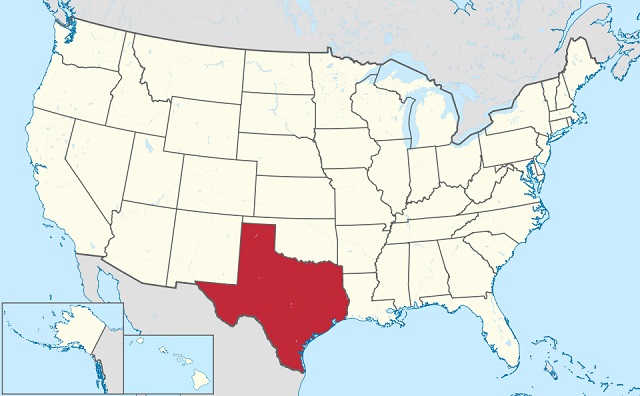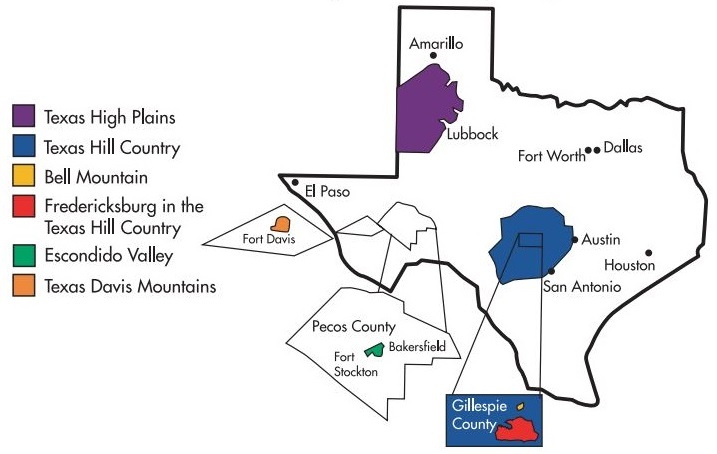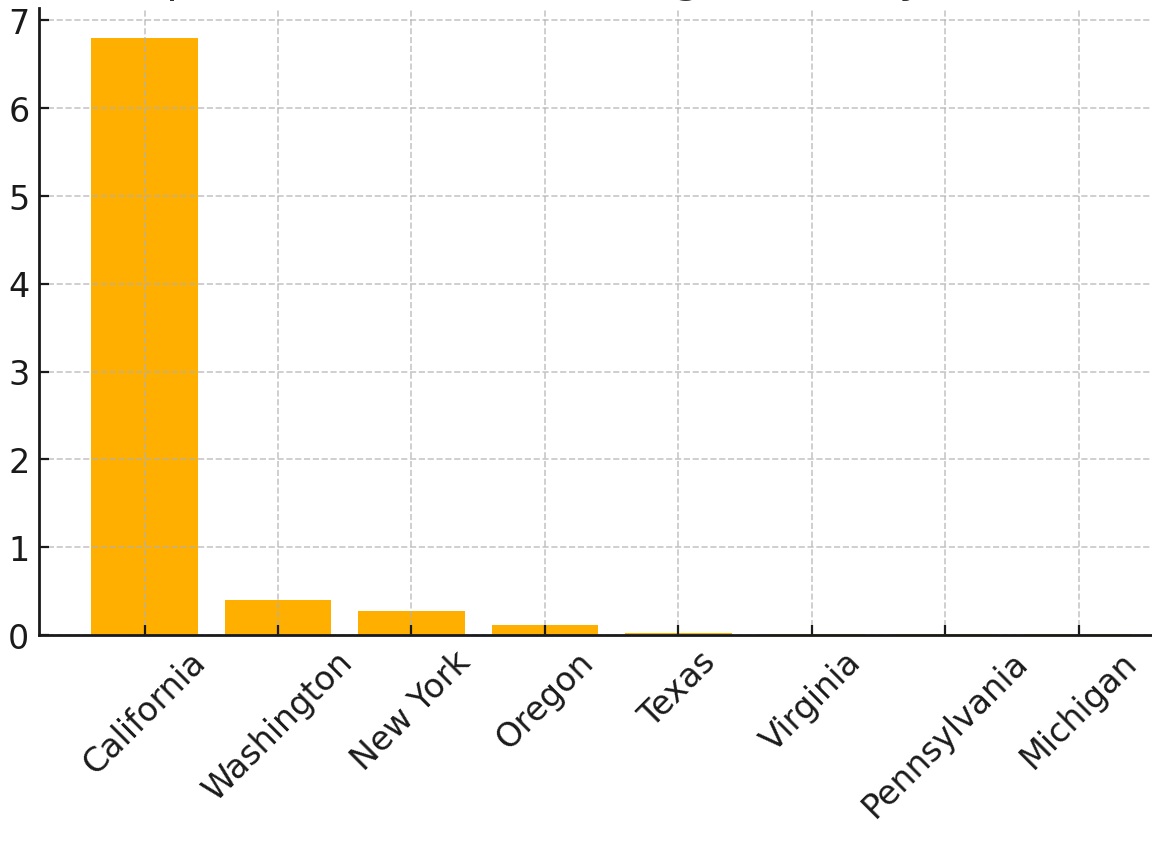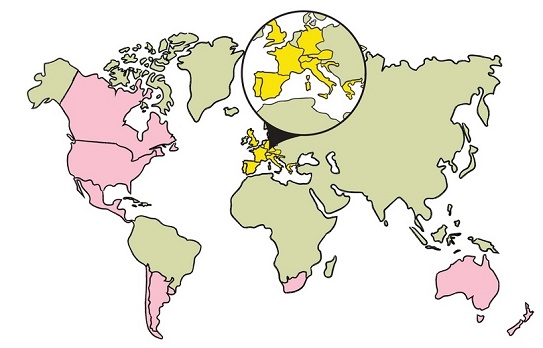Texas Wine
Wine production in Texas is a growing and increasingly respected industry in the United States, with a long history and diverse terroir.
Texas was home to some of the earliest recorded viticulture in North America, with Spanish missionaries planting vines in the 1600s.
3,200 Hectares
(8,000 Acres)
8 million Litres
400+ Vineries

Grapes
Cabernet Sauvignon and Tempranillo have the highest number of plantings in the state, followed by Merlot, Black Spanish, and Blanc du Bois as leading variety in bearing acreage planted.
Texas is also home to Mourvèdre, Sangiovese, Viognier, Muscat Canelli, and Malbec plantings.
The United States Department of Agriculture lists more than 53 wine grape varieties grown in Texas.
Red Grapes
| Grape | Description |
|---|---|
| Tempranillo | Known as the “signature grape” of Texas. |
| Cabernet Sauvignon | Popular but challenging in some regions. |
| Mourvèdre (Monastrell) | Performs well in warm climates. |
| Tannat | Bold, tannic wines gaining traction. |
| Sangiovese | Italian variety that handles heat well. |
| Grenache, Syrah, Malbec | Rhône and Bordeaux influences. |
White Grapes
| Grape | Description |
|---|---|
| Viognier | One of Texas’s top-performing white grapes. |
| Roussanne | Rhône variety, aromatic and age-worthy. |
| Albariño | Spanish variety, crisp and fresh. |
| Vermentino | Italian variety with citrusy freshness. |
| Chenin Blanc, Muscat, Trebbiano | Often used in blends or for sweeter styles. |
Texas Wine Regions
Texas is the fifth-largest wine-producing state in the U.S., after California, Washington, Oregon, and New York. The state has a range of climates and soils that support wine grape growing, from hot and arid to cooler, elevated areas. The main AVAs (American Viticultural Areas) in Texas include:
- Texas High Plains AVA
- Texas Hill Country AVA
- Texoma AVA
- Escondido Valley AVA
- Mesilla Valley AVA (shared with New Mexico)

Texas High Plains AVA
Texas High Plains AVA is located near Lubbock in northwest Texas. The area produces around 80% of Texas wine grapes due to favorable growing conditions.
- Climate
Semi-arid, with large diurnal temperature swings. - Elevation
High Altitude (3,000–4,000 feet). - Soil
Sandy loam (tiera roja) over caliche (limestone base). - Grapes
Ideal for Tempranillo, Cabernet Sauvignon, Malbec, Viognier, and Albariño.
Texas Hill Country AVA
Texas Hill Country AVA is located in Central Texas, west of Austin and north of San Antonio. It is one of the largest AVAs in the U.S. and a major tourism destination with over 100 wineries with tasting rooms.
- Climate
Warm with some elevation. More humid than the High Plains. - Elevation
1,000–2,500 feet. - Soil
Limestone-rich, rocky soils. - Grapes
Known for Tempranillo, Sangiovese, Tannat, Mourvèdre, and Viognier.
Texoma AVA
Texoma AVA is located in North-central Texas along the Red River. This region has a smaller production with experimental and diverse plantings.
- Climate
- Soil
- Grapes
Note
Texoma is the site where Thomas Munson developed rootstocks that saved European vineyards from phylloxera in the 19th century.
The horticulturist used Texas vines to create hundreds of hybrid grapes and conducted significant research in finding root stock immune to the Phylloxera epidemic, which saved the French and Europeean wine industry from total ruin.
Escondido Valley AVA
Escondido Valley AVA is located in West Texas near Fort Stockton.
- Climate
Hot and dry. - Soil
- Grapes
Limited production, primarily Cabernet Sauvignon and other heat-tolerant varieties.
Mesilla Valley AVA
Mesilla Valley AVA (shared with New Mexico) is located in the far western Texas near El Paso.
- Climate
Very hot and arid. - Soil
- Grapes
Smaller vineyards; growing some Rhône and Spanish varieties.
US Wine Production 2023
California has the dominant role in U.S. wine production, producing more wine (680 millon gallons) than all other states combined.

| State | Gallons | Hectares |
|---|---|---|
| 1. California | 680.0 million | 240,000 |
| 2. Washington | 41.0 million | 24,000 |
| 3. New York | 28.0 million | 14,500 |
| 4. Oregon | 12.0 million | 13,000 |
| 5. Texas | 2.1 million | 3,200 |
| 6. Virginia | 1.9 million | 1,800 |
| 7. Pennsylvania | 1.8 million | 1,600 |
| 8. Michigan | 1.5 million | 1,400 |
| 9. Missouri | 1.0 million | 1,300 |
US Grape Plantings
| Grape | Hectares |
|---|---|
| Chardonnay | 36,000 |
| Cabernet Sauvignon | 34,000 |
| Pinot Noir | 22,000 |
| Merlot | 19,000 |
| Zinfandel | 18,000 |
| Syrah | 9,000 |
| Sauvignon Blanc | 8,000 |
| Pinot Grigio | 7,000 |
| Petit Sirah | 4,500 |
| Riesling | 4,000 |
